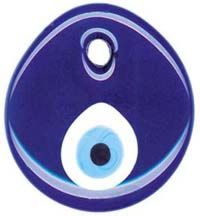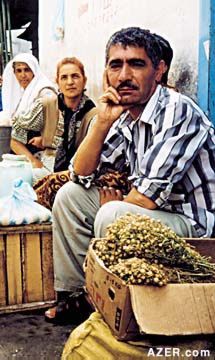|

Autumn 2000 (8.3)
Pages
55-57
The Evil Eye
Staving
Off Harm - With a Visit to the Open Market
by
Jean Patterson and Arzu Aghayeva
  Got a headache? Not
quite feeling up to par? Business not going too well? Perhaps,
to blame is the "evil eye". Got a headache? Not
quite feeling up to par? Business not going too well? Perhaps,
to blame is the "evil eye".
To a Westerner, the "evil eye" may sound like something
out of a goofy 1950s horror movie.
But to Azerbaijanis and others living in the Middle East and
Eurasia, the concept is quite tangible. People who are jealous
of you, your accomplishments or possessions are thought to have
the power to harm you just by wishing you evil. Despite the enormous
efforts of the Soviets to rout out traditional practices that
were considered superstitious, they never entirely managed to
rid the society of the belief in "the evil eye".
If you aren't convinced, visit some Azerbaijani homes. Inside
the front door, glance up above the door frame and you're likely
to find what is called "camel's needle"(Alhagi Camelorum)
- a dried out stem of thistles - or some other sort of good-luck
talisman.
Although most Azerbaijanis cannot be said to be superstitious
and, in fact, are really quite European in outlook and world
view, many still use charms to ward off bad luck. "Just
in case", they tell you, when you point out the contradictions.
Since some of the most common antidotes to counter the effects
of the evil eye can be purchased in the open markets, we went
there and interviewed some of the market vendors to find out
how widespread some of these beliefs and customs are.
_____
This past summer in one of the villages near Lankaran, close
to the border with Iran, the shadow of the evil eye passed over
an Azerbaijani wedding. Word had it that the village girls were
jealous of the bride from Baku who had snatched up a local boy
- a valuable catch. Rumors circulated that the local girls had
put the evil eye on the new bride.
The wedding took place back in the village. Once the bride heard
of the curse, she was troubled despite the fact that her family
scoffed at it. The bride was concerned that the spell might affect
her if she partook of any food or drink. Even though her family
didn't hold to such beliefs regarding the alleged "jadu"
(witchcraft), the bride was extremely uneasy. And so she sat
there all dressed up in her white wedding gown, veil and red
sash, refusing to touch any food or drink, all afternoon and
evening.
The Evil Eye
What exactly is the evil eye? Depending on who you ask, you're
likely to get different answers, but most Azerbaijanis agree
that you don't want to get in its way. This could happen if you've
made others jealous of you or of something that belongs to you.
If something unfortunate follows, some Azerbaijanis interpret
it as the work of the evil eye. It's also possible for another
person to bring harm unintentionally by complimenting you.
  The belief is so widespread
that some Azerbaijanis refrain from complimenting the parents
of a newborn child. They wouldn't want to blamed if something
bad happened to the child. For this reason, some traditional
families keep mother and child in seclusion for the first 40
days after the birth. Only closest relatives get the chance to
see them. The belief is so widespread
that some Azerbaijanis refrain from complimenting the parents
of a newborn child. They wouldn't want to blamed if something
bad happened to the child. For this reason, some traditional
families keep mother and child in seclusion for the first 40
days after the birth. Only closest relatives get the chance to
see them.
Left: At the Pasaj Bazaar,
Baku. A vendor displays his wares: lemons, parsley, yogurt and
small blue beads to ward off the "evil eye". Photo:
Blair
Some say you can even bring the evil eye upon yourself. For instance,
if you're proud about some accomplishment or become the envy
of others, then if you suddenly feel tired and drained of energy,
the evil eye is blamed. "Ozumun ozume gozum deydi,"
meaning "I brought the evil eye on myself."
Sure-Fire Protection
There are various prescriptions and remedies that are said to
protect against the evil eye. One of the most popular and ancient
ones is a plant called uzarlik (Peganum harmala). Farid Alakbarov,
one of Azerbaijan's foremost medical historians, notes a reference
to it in the 18th-century work "Tibbi-Jalinus" (The
Medicine of Galen). There an anonymous Azerbaijani source recommends
the following: "Take the right eye of a hyena and put it
in very strong vinegar for seven days. Then boil it and place
it close to uzarlik. No evil eye whatever can harm you. From
now on, you have to be bold. Don't be afraid of any witchcraft."
In modern times, uzarlik is still sold in the marketplace and
burned to ward off the evil eye. It costs 1,000 manats for one
portion - approximately 25 cents. According to one market seller,
Movsum Asgarov from Lankaran, the effect of the uzarlik depends
on where it has been grown and how it is burned. "My uzarlik
is gathered wild in the Khizi mountains," he says. "It
must be taken from a very remote place, where a rooster's crow
cannot be heard. Then its effect will be even stronger."
The Khizi mountains are located a few hours' distance north of
Baku on the road to Guba.
Asgarov says that his customers burn uzarlik on special occasions,
like after giving birth to a child, after purchasing a new car
or when getting married. "You burn uzarlik and then inhale
the scent," he says. "Also, when people around you
smell this smoke, they are stripped of the ability to cause you
harm. After that, spread the ash on your forehead and neck. That
will banish black energy from your blood vessels."
Another vendor, Afiyaddin from Ordubad, gathers the uzarlik in
the mountains himself. "We burn it and then pour water on
the ash to put out the fire," he says. While burning the
uzarlik, he chants: "Uzarliksan havasan, min bir darda davasan.
Na gadar ki, san varsan - dada, bala javansan." (Uzarlik,
you are air, you are against 1,001 griefs. As long as you exist,
fathers and sons will be young.) When asked if the plant does
any good, he says, "It's just what people say. I think the
main thing is God's will."
Another vendor suggested taking a small handful of uzarlik and
salt and encircling a person's head three times, while saying,
"Uzarliksan havasan, jami darda davasan. Pis gozlari chikhardib
ovujuna salasan." (Uzarlik, you are air, you are against
every grief. Take out evil eyes and put them in the palm.) Then
the uzarlik is cast into the fire and burned.
When asked if the uzarlik works, the vendor tells us, "Yes,
my son is two years old. He's very vulnerable. I took him to
the playground, and somebody put the evil eye on him. When we
came home, the child felt bad and was crying. As soon as we burned
uzarlik, however, he stopped crying."
Burning Seeds
Uzarlik is not the only Azerbaijani remedy for the evil eye.
An ordinary household spice, black cumin (gara chorakotu), is
also said to work against it. Not only are the cumin seeds used
in bread, but some Azerbaijanis burn them with salt, repeating
phrases like: "Oh God, don't let the evil eye harm us!"
or "Let the one with the evil eye lose his own eye."
  Atilbatil seeds can
also be burned for this purpose. One vendor who sells them explains
their appeal: "It's mostly young girls who buy them. They
burn an odd number of seeds (7 or 13 or so), and then spread
the smoke around the house to protect themselves against the
evil eye." Atilbatil seeds can
also be burned for this purpose. One vendor who sells them explains
their appeal: "It's mostly young girls who buy them. They
burn an odd number of seeds (7 or 13 or so), and then spread
the smoke around the house to protect themselves against the
evil eye."
He claims that this method works for him.
Left:
A vendor
in the Taza Bazaar sells "uzarlik" which is burned
to create an incense-like smoke that is said to ward off the
"evil eye". Photo: Aghayeva
"When I'm out of luck, I burn atilbatil, and then things
go well. I burn it every day - yesterday I burned it twice. I
wrap it in paper, then burn it. When you hear the seeds crack,
it means that the evil eyes have cracked. My grandmother used
it a lot when I was a child, since I was very vulnerable to the
evil eye." Atilbatil is more expensive than the other remedies,
costing 5,000 manats (about $1.25 U.S.) "Only well-off people
can afford atilbatil," the vendor admits.
Camel's Needle
Some plants are hung up instead of burned. For instance, near
the entrance to an Azerbaijani home, you may see a thistle-like
plant called camel's needle (Alhagi camelorum). This plant can
also be found in cars, hanging from the rear-view mirror. Just
like in ancient times, some Azerbaijanis believe that camel needles
protect humans from the evil eye and bring good luck and happiness.
They think that its sharp needles can pierce the evil eye - like
fighting fire with fire.
Yet another form of protection is the daghdaghan tree, which
grows in Nakhchivan. According to one vendor, Afiyaddin from
Ordubad, daghdaghan branches are hung on thread and worn in order
to guard against the evil eye. Its pea-sized fruits are pierced,
threaded and sewn onto clothes or hung as ornaments.
Blue Beads
Several vendors at the market also sell gozmunjughu, small blue
or black glass beads that have a black spot inside a white circle,
resembling the iris of an eye. These beads are tied with thread
and placed around a child's arm. Or, one bead may be safety -
pinned to a child's shirt. Sometimes just a safety pin is worn
with no glass bead.
There are also larger versions of the gozmunjughu, which are
hung in the hall of a home or above a door. One vendor explains,
"People say that when somebody puts his evil eye on you,
these spots fall out or the bead breaks." This is a common
practice in Turkey where belief in the evil eye is quite prevalent.
In fact, businessmen from Turkey are displaying very large evil
eyes in the entrances of their buildings. Take a look at the
new addition at Hyatt Regency, the ISR Tower and some of the
new high rise apartment complexes. One of the most recent samples
of this big blue ornament can be found at the entrance of the
new McDonald's off Baku's Fountain Square.
  Left: Near the entrance door of the new McDonald's
on Fountain Square is a large blue ornament to ward off the "evil
eye". Photo: Mastanova Left: Near the entrance door of the new McDonald's
on Fountain Square is a large blue ornament to ward off the "evil
eye". Photo: Mastanova
Better Safe Than Sorry
When we ask the vendors how they knew that these items countered
the evil eye, they just shrug and say, "People say that
they work." But how do Azerbaijanis know that harm was kept
away? How do they know that they would have been harmed by the
evil eye? Perhaps Azerbaijanis don't believe that good times
will always be with them. Being afraid of the evil eye brings
about the opposite of conspicuous consumption in a society. Instead
of trying to show off in front of your neighbor by displaying
more expensive possessions than he does, some Azerbaijanis, especially
the elderly, are more modest, for fear that bragging about their
possessions might cause them to lose them.
When a Westerner "knocks on wood," to convey the meaning
"I hope my luck doesn't change for the worse," the
feeling is much the same. When things are going especially well,
it's only human to feel vulnerable and wonder: "This is
too good to be true. Something is bound to go wrong." Trusting
ancient remedies like uzarlik and camel's needle provides a sense
of security in a precarious world-a world in which history has
proven over and over again that one's luck can reverse itself
without warning.
Jala Garibova, Narges Abadi and Farid Alakbarov
also contributed to this article.
_____
From Azerbaijan
International
(8.3) Autumn 2000.
© Azerbaijan International 2000. All rights reserved.
Back to Index
AI 8.3 (Autumn 2000)
AI Home
| Magazine Choice | Topics
| Store
| Contact
us
|